BY : Dr.Torhan Al-Mufti
The English term “checks and balances,” which translates to (الضوابط والتوازنات) in Arabic (with other translations available depending on context), importantly signifies the concept of provision with oversight, or alternatively, the process of granting authority and will over power in a specific manner while maintaining balances. This contributes to curtailing political expansion or administrative dominance. Thus, the term “checks and balances” is not only used in political fields but also has broad applications in all aspects of life and administrative methodologies. In the administrative field, the executive branch holds the power of management and accomplishment. For the purpose of control and balance, there are financial oversight and administrative control over executive bodies to prevent the overstepping of authority and the misuse of public funds or the executive entities’ dominance over financial resources, whether well-intentioned or malicious. Ultimately, the principle of “checks and balances” acts as a safety valve and the most effective protective element in preserving the executive apparatus from deviation, expansion, and rigidity; making it unsuitable for the executive body.
We also find the principle of “checks and balances” in most mature constitutions around the world, regardless of whether the constitution is rigid or flexible, as is the case with the permanent Iraqi Constitution of 2005. It contains multiple locations, articles, and terms aimed at implementing the principle of “checks and balances,” where the separation of executive, legislative, and judicial powers is the pinnacle of using this important principle, contributing to framing the management of the state. The same applies to the Federation Council (not yet completed), which is part of the same principle in preserving legislative councils from expanding at the expense of other powers. Lastly, and importantly, granting the power to protect the constitution and maintain the country’s unity to the presidency as the highest capacity in control and balance in the country.…
Returning to the beginning of the discussion regarding the principle of “checks and balances” in political corridors and its importance, which is no less significant than what we mentioned in other fields. In fact, regulating the pace and balance in the political arena is even more important, as governments, parliaments, and all state apparatus are formed on this basis. Accordingly, any imbalance in the principle of “checks and balances” as inputs of the political process will result in incorrect outputs and deviate as a result.
Secular Parties
For example, the existence of conservative religious parties alongside secular or civil parties means that checks and balances will protect both wings from expanding and from imposing a certain policy on citizens or adopting a specific external view of the state, and so on.
What Do We Have in Iraq?
The principle of “checks and balances” in the country’s politics exists at several levels,
These levels are:
Firstly: The relationship between the majority and the minority and the centrist components among them. Thus, the idea is to prevent the majority from exercising dictatorship over the minority and the centrist components. Here, the concept of majority applies to (Shiites, Sunnis, Kurds) combined, while the concept of centrist components is represented by Turkmens (as a third component according to the constitution but not part of the majority or the minority), and the minorities consisting of (Christians and other spectrums).
After 2003, through following democratic and pluralistic foundations, the work was according to the principle of pushing centrist and minority components forward and participating in the political and administrative process in the country at its best. However, over time and up to the current moment, these contributions have diminished, almost ceasing for some components, especially the Turkmens, thus weakening the concept of checks and balances and showing dominance of the majority over the political and administrative decision for these components and even geographic expansion on them.
Secondly: Represented by (checks and balances within the majority components internally, i.e.,
1- The control and balance between Kurdish parties, where until recently, the Patriotic Union of Kurdistan and the Kurdistan Democratic Party were on one side and many Kurdish and Kurdistan parties on the other, making it the principle of control and balance in the Kurdistan region. However, over time and for reasons not discussed here, both sides of the equation transformed into a different picture, with the Kurdistan Democratic Party on one side and the Patriotic Union of Kurdistan on the other.
As they were initially on one side, the current divergence in orientations led to the disappearance of control and balance in the region, resulting in a state of political stagnation and a new political alignment that harmed the region as a political presence and a political force in Baghdad and internationally at times.
2- The control and balance between Sunni orientations. The reality is that the Sunni spectrum has been facing a very complex problem since 2003, with the change in paths for secular and religious parties, leaving no room for the principle of “checks and balances” to rise; thus, enhancing the loss of much effort and entering the Sunni spectrum areas into deep and unclear disputes; making this spectrum in a state of almost permanent political instability.
3- The control and balance within Shiite forces. The reality is that the principle of “checks and balances” shines in its best form among Shiite forces, with the presence of conservative Shiite forces and religious ideological currents together, and on the other hand, the Sadrist movement, thereby each side limiting the other in certain cases and in different decisions creating a crystallized type of domestic policy within the Shiite spectrum. However, what happened from the withdrawal of the Sadrist movement from the official political arena lost the principle subsequently showing cases of expansion and regional decisions due to its absence, and the situation would have been the same if the Sadrist movement remained and the other Shiite forces withdrew.
Thirdly: Represented by (sectarian – nationalist checks and balances), here also, this principle began to grow differently from what it was, and this level has gone in two directions:
Arab Parties
1- The sectarian direction, which is the inclination of Sunni Arab parties towards Kurdish parties in general in most decisions in Baghdad against Shiite decisions; creating a type of control and balance in political dominance according to the vision of those parties with the existence of geographic expansion from this side or the other, and this situation continued from 2003 to 2017.
2- The pure nationalist direction, which is the emergence of the nationalist sentiment for Sunni and Shiite Arab spectra over sectarian affiliations in areas outside their actual control for the purpose of control and balance with Kurdish forces, especially in the (disputed areas), and this concept began to grow after the events of 2017, which cast its shadow within the second level on the Kurdish-Kurdish relations.
Where Are We Now? Now, after this detail of the concept of “checks and balances” in the political file and the non-harmonic changes in this file;
Which began to create large and branched disparities and, over time within this governmental era, there will be additional variables and complexities due to the imbalance in the concept of (checks and balances) whether within spectra internally or inter-spectrally or component-wise (majority, centrist components, and minority); which will necessarily affect the democratic course and the pluralistic growth of the state, and for the purpose of realizing what can be realized and developing (more healthy and more stable checks and balances) we find it necessary to undertake one of the following proposals:
1- Holding an extensive political conference for party leaders and political formations within a roundtable to reach political understandings that allow
the continuation of a peaceful political situation in the country and leaves enough space for the current government to work according to its government program perspective.
2- Resorting to the difficult decision represented by early elections for the purpose of working on encompassing all those parties together with gathering the different political orientations which might complicate the country’s political scene with or by them. This does not mean that the current government is part of the political problems, but conducting early elections would create an atmosphere of harmony and political competition, which could result in newer, more stable political agreements for Iraq.

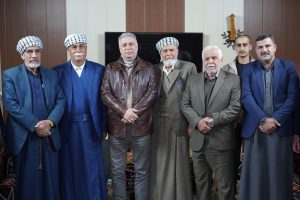
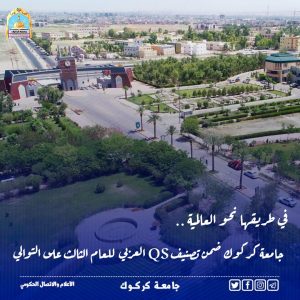
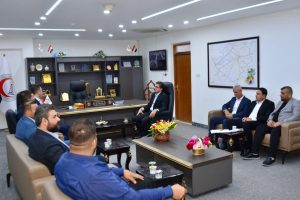
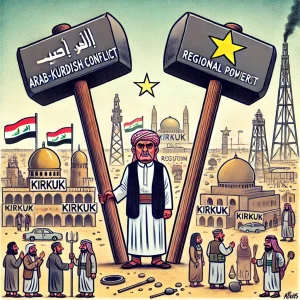
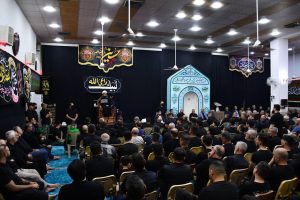
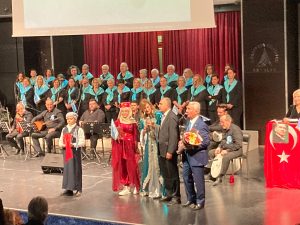

Be First to Comment